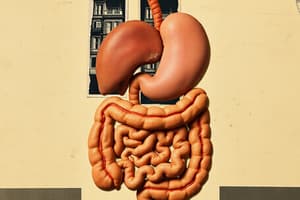Podcast
Questions and Answers
Which organ is primarily responsible for nutrient absorption?
Which organ is primarily responsible for nutrient absorption?
- Stomach
- Small Intestine (correct)
- Large Intestine
- Esophagus
What is the main digestive process that occurs when food is broken down into smaller molecules by enzymes?
What is the main digestive process that occurs when food is broken down into smaller molecules by enzymes?
- Mechanical Digestion
- Absorption
- Chemical Digestion (correct)
- Ingestion
Which digestive disorder involves chronic inflammation of the digestive tract?
Which digestive disorder involves chronic inflammation of the digestive tract?
- Irritable Bowel Syndrome (IBS)
- Gastroesophageal Reflux Disease (GERD)
- Gallstones
- Inflammatory Bowel Disease (IBD) (correct)
What is the primary function of bile produced by the liver?
What is the primary function of bile produced by the liver?
Which process in the digestive system involves taking in food through the mouth?
Which process in the digestive system involves taking in food through the mouth?
How do gallstones primarily affect the digestive system?
How do gallstones primarily affect the digestive system?
Which digestive organ uses peristalsis to move food toward the stomach?
Which digestive organ uses peristalsis to move food toward the stomach?
Which enzyme produced by the pancreas is responsible for the breakdown of carbohydrates?
Which enzyme produced by the pancreas is responsible for the breakdown of carbohydrates?
What does the large intestine primarily absorb from undigested food?
What does the large intestine primarily absorb from undigested food?
Which term describes the elimination of indigestible substances from the body?
Which term describes the elimination of indigestible substances from the body?
Flashcards
Ingestion
Ingestion
First part of digestion, taking food in through the mouth
Mechanical Digestion
Mechanical Digestion
Physical breakdown of food (e.g., chewing, churning)
Chemical Digestion
Chemical Digestion
Enzymatic breakdown of food into smaller molecules
Absorption
Absorption
Signup and view all the flashcards
Excretion
Excretion
Signup and view all the flashcards
GERD
GERD
Signup and view all the flashcards
IBS
IBS
Signup and view all the flashcards
IBD
IBD
Signup and view all the flashcards
Celiac Disease
Celiac Disease
Signup and view all the flashcards
Constipation
Constipation
Signup and view all the flashcards
Study Notes
Organs Of The Digestive System
-
Mouth:
- Begins mechanical digestion (chewing).
- Saliva contains enzymes (amylase) for carbohydrate breakdown.
-
Esophagus:
- Muscular tube connecting mouth to stomach.
- Uses peristalsis to move food downward.
-
Stomach:
- Secretes gastric juices (HCl, pepsin) for protein digestion.
- Churns food into chyme.
-
Small Intestine:
- Main site for digestion and nutrient absorption.
- Divided into three parts: duodenum, jejunum, ileum.
- Enzymes from pancreas and bile from liver aid digestion.
-
Large Intestine:
- Absorbs water and electrolytes.
- Stores waste (feces) until excretion.
-
Liver:
- Produces bile for fat emulsification.
- Processes nutrients and detoxifies substances.
-
Gallbladder:
- Stores and concentrates bile.
-
Pancreas:
- Produces digestive enzymes (lipase, amylase, proteases).
- Secretes bicarbonate to neutralize stomach acid.
Digestive Processes
-
Ingestion:
- Taking in food through the mouth.
-
Mechanical Digestion:
- Physical breakdown of food (chewing, churning in stomach).
-
Chemical Digestion:
- Enzymatic breakdown of food components into smaller molecules.
-
Absorption:
- Nutrients absorbed primarily in the small intestine into the bloodstream.
- Water absorbed in the large intestine.
-
Excretion:
- Elimination of indigestible substances as feces.
Common Digestive Disorders
-
Gastroesophageal Reflux Disease (GERD):
- Acid reflux causing heartburn and regurgitation.
-
Irritable Bowel Syndrome (IBS):
- Functional disorder causing abdominal pain, bloating, and altered bowel habits.
-
Inflammatory Bowel Disease (IBD):
- Includes Crohn's disease and ulcerative colitis.
- Chronic inflammation of the digestive tract.
-
Gallstones:
- Solid particles forming in the gallbladder, causing pain or blockage.
-
Celiac Disease:
- Autoimmune disorder where gluten ingestion damages the small intestine lining.
-
Constipation:
- Infrequent or difficult bowel movements.
-
Diarrhea:
- Frequent, watery stools; can result from infections, diet, or digestive disorders.
Organs of the Digestive System
- Mouth: Initiates mechanical digestion via chewing; saliva contains amylase for carbohydrate breakdown.
- Esophagus: Muscular tube that connects mouth to stomach; utilizes peristalsis to transport food.
- Stomach: Produces gastric juices (hydrochloric acid and pepsin) crucial for protein digestion and transforms food into chyme.
- Small Intestine: Primary location for digestion and nutrient absorption; consists of three segments: duodenum, jejunum, ileum; pancreas enzymes and bile assist digestion.
- Large Intestine: Absorbs water and electrolytes; stores waste until elimination as feces.
- Liver: Generates bile for fat emulsification; processes nutrients and detoxifies harmful substances.
- Gallbladder: Stores and concentrates bile produced by the liver.
- Pancreas: Produces digestive enzymes (lipase, amylase, proteases) and secretes bicarbonate to neutralize stomach acidity.
Digestive Processes
- Ingestion: Process of taking food into the body through the mouth.
- Mechanical Digestion: Involves physical food breakdown through actions like chewing and the churning of food in the stomach.
- Chemical Digestion: Involves enzymatic decomposition of food into smaller, absorbable molecules.
- Absorption: Nutrient absorption mainly occurs in the small intestine, while water is absorbed in the large intestine.
- Excretion: Elimination of indigestible substances occurs as feces.
Common Digestive Disorders
- Gastroesophageal Reflux Disease (GERD): Condition characterized by acid reflux, which leads to heartburn and regurgitation.
- Irritable Bowel Syndrome (IBS): Functional gastrointestinal disorder causing symptoms like abdominal pain, bloating, and altered bowel habits.
- Inflammatory Bowel Disease (IBD): Encompasses conditions like Crohn's disease and ulcerative colitis, leading to chronic inflammation in the digestive tract.
- Gallstones: Solid formations in the gallbladder that can cause pain and obstruction.
- Celiac Disease: Autoimmune disorder triggered by gluten consumption, damaging the small intestine lining.
- Constipation: Condition involving infrequent or challenging bowel movements.
- Diarrhea: Characterized by frequent, watery stools, potentially caused by infections, dietary factors, or digestive disorders.
Studying That Suits You
Use AI to generate personalized quizzes and flashcards to suit your learning preferences.




